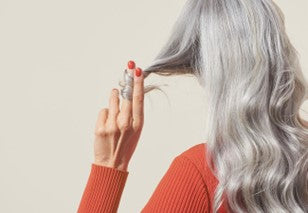
We have clients tell us often that once they were in menopause, they started losing hair. This can be very hard for a woman as our hair is part of our identity. Here we are going to give you some information about menopause and how it may affect your hair.
Menopause typically happens to women between the age of 45 and 55, about 12 months after a woman’s last period. Menopause is a normal part of aging for women, as it can typically last about 7 years but can be as long as 14 years. The duration of menopause is different for every woman depending on the woman’s lifestyle factors, such as smoking, age, race and ethnicity. Many women have trouble with menopausal symptoms, such as loss and thinning of hair, hot flashes, weight gain, trouble sleeping and more.
Menopausal hair loss vs hair shedding:
Humans typically lose on average about 50 to 100 strands of hair a day. This is known as hair shedding. Hair shedding is a natural process of hairs falling out and new hairs growing in. When menopausal hair loss begins to occur, it is when hair shedding starts to become more evident.
Some signs of menopausal hair loss:
- Your hairbrush filling with hair more frequently
- More hairs collect in the shower drain
- Finding your hair around the sink or on your pillow or clothes
- Hair breakage becomes more common
When symptoms like these continue you may notice your part widening, your ponytail looking thinner, and thinning patches on your scalp.

How we really feel:
For many women, having control over our hair, such as how we choose to style, cut and wear it, is a big factor in our self-expression and personality. Losing hair can mean that we may feel less ourselves, as having control over our hair can be a lot harder with less of it.
It is important to remember that when losing hair during menopause there is nothing medically wrong, unless accompanied by other symptoms. Experiencing hair loss and thinning during menopause is completely normal to most women. Fortunately, there are some solutions to decreasing the amount of hair you lose and keeping your hair from thinning and this is where we can help.

Solutions:
- Topical solutions such as thickening serums can help improve hair appearance. Such as our hero product Unveil No. 3 Hair thickening serum to help produce a fuller, thicker head of hair. Unveil’s Thicker Hair Serum is easy to use and is only to be applied to your scalp once a day and you’ll see results in as little as 4 weeks.
Benefits with our products is that they are restorative. Meaning the ingredients we use are non-toxic, have no known carcinogens, gluten free, and vegan (no-animal products)!
Our active ingredients are plant based and apple stem cell cultures.
- Reducing the use of heat damaging tools such as straighteners and hair dryers can also improve hair appearance. Less heat = less damage.
- A healthy diet means a healthy body. Having a healthy diet can also help to improve hair appearance. It is important that you take care of your body during menopause as your body is undergoing a lot of changes. The best way to do so is maintaining a healthy diet.
-
Many medications have an abundance of side effects. Checking any medications that you use can help reduce hair loss and thinning. Medications that can cause hair loss include:
- Antidepressants
- Disease-modifying anti-rheumatic drugs (DMARDS) used to treat rheumatoid arthritis and other autoimmune diseases
- Epilepsy medications
- Heart medications (blood thinners and beta-blockers)
- Medications used to treat hyperthyroidism
In Summary:
Hair loss during menopause is a difficult symptom for many women. Having the creative freedom to style, cut and wear our hair makes us a part of who we are. When hair loss is experienced from menopause this can take a toll on our mental health and confidence. Fortunately, there are solutions to helping improve hair appearance, such as serums like Unveil’s Thicker Hair Serum, reducing the use of heat damaging tools, a healthy diet, and the use of medications. Remember to be kind to your body during menopause and encourage healthy practices that can reduce hair loss and thinning.




